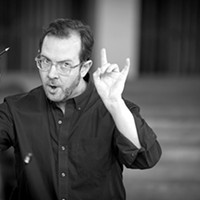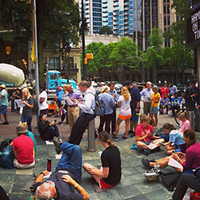Thirteen years after Angels in America premiered in Charlotte, there is finally consensus about the controversy that broke our city into warring camps, exposed our provincialism to nationwide ridicule, and eventually resulted in the self-immolation of the Queen City's flagship regional theater company. Eric Coble, the playwright commissioned by Actor's Theatre of Charlotte to write a fictionalized account of our celebrated Culture War, came here late in 2007 to speak with people involved in the struggle. On one key point, he found surprising agreement.
We all overreacted.
The comic absurdity of it all will be center stage as Coble's Southern Rapture opens for previews this Friday night. With full frontal nudity, of course. Otherwise, how can Charlotte affirm that we've grown up since 1996?
"You've really got to listen to both sides of the story every time in order to form a good opinion," says Actor's Theatre artistic director Chip Decker. "The first time around, you had people screaming on both sides, and everybody thought they needed to be heard more than the next person. And eventually nobody was heard, because the screaming just became laughably loud."
Decker saw the comedic possibilities way back in the 1990s, when Actor's Theatre was still a tenant at Spirit Square and the embarrassment of Angels was beginning to dim. He convinced Dan Shoemaker, ATC's executive director, that the face-off between Charlotte Repertory Theatre and the Rev. Joe Chambers' army of Concerned Charlotteans was the stuff of a good play.
But it wasn't until 2004, when ATC had finally created its own home at 650 E. Stonewall St., that the project began to gain traction. When Coble came to Charlotte in conjunction with the company's production of Bright Ideas, Shoemaker realized that they had stumbled upon the kindred spirit to execute Decker's farcical concept.
Coble bit on Shoemaker's pitch, and he wholeheartedly agreed to a balanced perspective on the delicate issues of free speech and the proper use of tax dollars. Five years later, with the help of a patron's angelic $50K contribution, we can all look back in laughter. What we see through deftly distilled composite characters is the spectacle of theater people, religious zealots, politicians and media all behaving badly.
And just because we say Coble takes a balanced approach, don't assume he's gentle about it.
Portraits of two key characters on the side of Tony Kushner's Angels are particularly unflattering -- and hilarious in the playscript I peeped at. Through the thinnest gauze of fiction, Charlotte Rep managing director Keith Martin becomes World Stages producing director Donald Sherman, a nonpareil publicity whore. Charlotte Observer theater reporter/critic Tony Brown wears even less makeup, transforming into Observer critic Simon Larisher, a cynical fomenter of controversy.
We're not explicitly in Charlotte. Instead, we're in "A City in the Southern United States" in February 1995. With a place called Myers Park not far from rehearsals of Rapture in America and a mayor, Winston Paxton, who devoutly hopes to land the 2004 Olympic Games in his hometown.
As one of the people whom Coble interviewed, I wondered why the playwright wasn't packing a microcassette. Reporters feel naked without one. Coble apparently wanted to avoid quoting any of his sources verbatim. Key people in the Angels melodrama weren't interviewed because Coble wanted to imagine them more freely. Rep artistic director Steve Umberger didn't sit down with Coble, and the playwright says he has never met Martin although he has spoken to him. Very briefly.
So the portrait of the managing director as publicity whore comes from Coble's imagination -- and his other sources.
"That seemed to be a common thread amongst people who did talk about [him]," Coble admits. "I mean, that's his job, to get people into that theater, whatever it takes. You get a golden opportunity like this, absolutely you're going to run with it and make something out of it."
Despite the biggest publicity and outreach campaigns in Rep's history, the opportunity didn't become golden until a Tony Brown feature on Angels in America fired up the front page of the Charlotte Observer on the same week that Part 1 of the seven-hour Pulitzer Prize drama was scheduled to open. While it may have been questionable to put that story next to everybody's morning coffee, the citywide furor that erupted in the wake of Brown's story was unquestionably big news.
With high drama. Until Martin and lawyer Bob Diehl appeared before TV cameras on March 20, 1996, brandishing a court injunction -- obtained one minute before a 5 p.m. deadline decreed by PAC president Judith Allen -- nobody was sure whether Angels would actually open at Booth Playhouse.
All of this heroic brinksmanship was necessary because, for a full eight seconds, actor Alan Poindexter would be exposing his peepee in public. With coverage in the New York Times, USA Today, Time, and a horrific live smackdown on Good Morning America that marked the apex of our embarrassment, media nationwide shone their fickle spotlight on Poindexter's penis and Charlotte's provincialism.
Bad week for our world-class pretensions.
"My impression was that the whole thing came out of that front page story," Coble confides. "From what I could read in the press and talk to people, that seemed to be the big trigger. The theater thought they were going along and preparing the community, and the community didn't seem to particularly care. Then suddenly, here was this article, and things exploded."
Coble capitalizes on his golden opportunity, demonizing Larisher just enough that he's frequently lurking backstage during Rapture rehearsals, trolling for quotes to further inflame the citywide controversy, and twisting what Poindexter counterpart Mickey Stedman says to suit his purposes. Compared with the firewall Coble maintains between the real-life Martin and the fictionalized Sherman, there's virtually none between Brown and Larisher.
Why bother? You see, when Brown jumped ship at the Charlotte Observer -- before JoAnn Grose and Julie York Coppens followed him -- it was to become the theater critic at the Cleveland Plain Dealer. Coble was already an established Cleveland writer, part of The Playwrights' Unit at Cleveland Play House, before he first became involved with Actor's Theatre of Charlotte.
So Brown was one of the first people Coble interviewed when he plunged into his Angels research. Nor does he deny that his Larisher is an apt, pointed portrait.
"I'm glad you feel it's apt," Coble responds. "I have no idea whether Tony would. I'm certainly going to invite him down to see the show. I know he comes back to Charlotte fairly frequently, and I'd love to get his point of view. I'm sure he's never been onstage before, in that regard, so I think that would be fun for him. But whether or not he likes what he sees, I have no idea."
Whoa, isn't that a little too much candor?
"I wasn't trying to do a caricature of Tony Brown per se," Coble backpedals. "Throughout the play, there's the desire by the media to find the story and to build the story. If it looks like there's a little flame there, then get in there and poke around. And if it happens to fire up even bigger, well, that's more exciting. So, as opposed to that being Tony Brown, I think that's my portrayal of the media. And the Good Morning America thing is the same way. They just keep goading on, trying to build a bigger and bigger argument, to further divide as opposed to bring together."
Up until auditions, Decker didn't know whether any of the original Angels in America cast might show an interest in Coble's provocative offshoot. None did. But a couple of Rep stalwarts are playing key roles in Southern Rapture, onstage and off. Tim Ross, who starred with Rep in Proposals and Last Night of Ballyhoo, will be Mayor Paxton. Claudia Carter Covington, who distinguished herself in Some Things That Can Go Wrong at 35000 Feet and Eleemosynary, was also Rep's literary manager, playing a key role in the annual New Play Festival.
As Actor's Theatre takes its maiden voyage in new play premieres, Covington is midwifing, serving as dramaturge for successive drafts of Southern Rapture. Preparing to work with Coble, she bought everything of his that she could. She liked what she read.
"I was really thrilled to think that he was the guy who was going to take this on," she says. "I just felt that he was exactly the right playwright for this. I still think that. Eric had a really wonderful play when it came to me in the first draft."
Leading up to Angels, Covington participated in Rep's decisions about the educational outreach the company would do in the community, and though she wasn't involved in the production itself, she was at all the staff meetings when the town went ballistic. That made her a perfect interview subject for Coble.
Covington was pleasantly surprised that Coble's treatment is so close to the real story. What didn't surprise her was the playwright's choice for the hysterical climax that ends Act 1.
"Anybody who knew anything about the debacle would have known that the comedy had to come out of the Good Morning America thing," she says. "I mean, that was ludicrous! I saw that conversation, and it was absolutely ridiculous. I don't think Keith and the mayor were ridiculous, but I think that conversation was absolutely absurd, particularly that it was on national television."
After devoting 20 years to the Rep, Covington still feels the impact of the retributions inflicted upon Martin, Umberger, and all the other taxpaying artists who performed, designed and directed in the company. The pain and the anger are still in her voice -- along with the talent and the intelligence.
"It shouldn't have ended the way it ended," she affirms. "We should have been able, all of us, to misbehave a little and still have a regional theater, for God's sake."
Angels in the Loaf
We were more than a little naive. In the run-up to the groundbreaking premiere of Angels in America, I thought it was all about the art and the drama. Back then, Hoyle Martin wasn't known as a homophobic ogre. In our Oct. 7, 1995 edition, he's a mayoral candidate, and the debate between Martin and incumbent Pat McCrory doesn't have a single word about arts funding or Angels.
Angels was definitely a big deal to us. That same issue had a huge spread on the "former wunderkind" who would star as Prior Walter in his Charlotte Repertory Theatre debut, collaborating for the first time with Rep founder Steve Umberger. "Poindexter in America" certainly mentions the vicissitudes of growing up homosexual in the South, but somehow the subject of those eight seconds of nudity never comes up.
Worries? I wrote an op-ed in mid-1995 warning that the usual helter-skelter of three-week rehearsal schedules wouldn't cut it for shows as long and as technically demanding as Angels, Parts 1 and 2. Umberger later told me that the rant had been useful in securing budgeting for a full five weeks of rehearsal.
Our political writers kept a watchful eye on local government and the ominous Board of County Commissioners. As late as Dec. 21, Jerry Klein termed the newly elected bunch "Insufferable Fools" in one of our two-word headlines of the day, but arts defunding and censorship weren't among their blunders.
Giddy exuberance reigned as the March 20 premiere approached. We were one of only six cities across the U.S. licensed to present both parts of Angels after their epochal Broadway run. Seattle, Houston, Atlanta, Chicago and San Francisco were the only others to land this prize.
We were particularly proud at the Loaf because we were the only sponsors of Angels in America. "Everybody else apparently took note of the controversial subject matter and turned tail," I crowed in our celebrated cover story that hit the streets on March 13. That lack of bedrock support from Charlotte's vaunted business community would have me -- and arts organizations around town -- eating crow for years to come.
Our cover story featured a lengthy Q&A with playwright Tony Kushner. Both of us were guilty of tossing caution to the winds. It was the height of the Clinton Years. The horrors of the Reagan administration that Kushner railed against in Angels -- the homophobia, the callousness towards AIDS victims -- were things of the past. Let Limbaugh fume as much as he liked, Slick Willie would surely be re-elected. The president's penis hadn't yet made the front page. Nor had Poindexter's.
During our interview, Kushner's fatal response came when I voiced surprise that his un-Christian depiction of angels and heaven hadn't sparked any reactions:
"I'm sort of disappointed that the religious right has left the play alone as much as it has. I mean it's all paid for by the NEA! That seems to have escaped everybody's attention. The crazy people came out in Clearwater, Florida, and made a little bit of a fuss. But it was very unimpressive fuss for those people."
Buried in the 49th paragraph of our cover story, down near the bottom of page 18, Kushner's taunt didn't figure to cause as much harm as the front-page feature that followed in the Observer. Our newshound of the day, Vance Cariaga, pointed out the folly of my humble presumption. The Rev. Joe Chambers had read the Loaf story, he'd seized upon the NEA taunt, and he'd reprinted it alongside an excerpt from the Observer to rally his followers.
Cariaga and I double-teamed the Angels opening in the Loaf edition that hit the streets on March 27. With breathtaking swiftness, the repercussions of the Rep ruckus were painfully clear.
"The bad news is that future local government funding of the arts is now up for grabs," I wrote in my review of Part 1: Millennium Approaches. "The good news is that thousands of outraged and embarrassed citizens are now voicing their support, snapping up Angels tickets in record numbers, and learning at a very opportune moment just how good Charlotte Rep can be."
Overall, we swaggered with confidence about the future -- and impudence toward the bad guys. When the infamous Don Reid prolonged a city council meeting by insisting on reading an 80-second excerpt from Angels into the record, I videotaped the performance and reviewed it.
"You'll be surprised to learn that the bespectacled Councilman's performance was quite spirited," I gushed. "Expression nearly crossed his face on numerous occasions."
We were the Loaf, y'all. We did stuff like that.
Cariaga and I both slept on the Good Morning America fiasco and its lingering shockwaves. But Cariaga kept his focus on two key points that the rest of Charlotte has conveniently slept on ever since: how Rev. Chambers intimidated the city's leadership, and how he got away with inflating the number of Concerned Charlotteans in his flock.
On March 14, 1996, Chambers sent a fax to an unnamed city council member. Referencing "the questionable homosexual oriented drama" scheduled to open six days later, Chambers demanded a response on whether "you oppose or promote this kind of event." Rev. Chambers promised to publicize the names of people who promoted Angels, opposed Angels, or refused to respond.
That fax soon had Mayor McCrory, PAC president Judith Allen, and District Attorney Peter Gilchrest falling in line behind Chambers and his army of Concerned Charlotteans. Like the meek sheep they were.
And exactly how many upstanding citizens were enlisted in that mighty army? On March 20, Mike Collins tried to get Chambers to divulge how many people he represented on his WBT talk show. Chambers evaded the question, but on that chilly night when picketers gathered at the PAC before Angels triumphantly premiered, Cariaga was there to do a headcount.
"Perhaps Chambers' greatest PR move last week was convincing people that he enjoyed 'incredible community support' in his effort to have Angels banned," Cariaga wrote (assisted by Vahni Georgoulakos). "That 'incredible community support' translated into about 15 protesters on opening night. Conversely, protesters in support of Angels numbered between 150 and 200."
All these years later, that simple statement of fact, that overwhelming 10:1 picket-line ratio is still astonishing. How could one religious crackpot, a fax machine, and a mere 15 followers strike so much fear, wield so much power, and cause so much pain and grief for so long?
To answer that question, you need to understand what Charlotte was like in 1996 -- and for years afterwards. Maybe, with the help of Eric Coble's Southern Rapture, we can begin to laugh at those times. Maybe we've grown up sufficiently since then.
Latest in Performing Arts
More by Perry Tannenbaum
Calendar
-

WHISKEY TASTING: VIRGINIA HIGHLANDS WHISKY @ Elizabeth Parlour Room
-

NEW WINDOW GALLERY-Pat Rhea-ACRYLIC PAINTINGS-April 05-30 2024 VALDESE, NC 28690 @ New Window Gallery/Play It Again Records
- Through April 30, 12 p.m.
-
An Evening With Phil Rosenthal Of "Somebody Feed Phil" @ Knight Theater
-
Kountry Wayne: The King Of Hearts Tour @ Ovens Auditorium
-

Trap & Paint + Karaoke @ Zodiac Bar & Grill
-
Jessica Moss Makes the Gantt Center a Safe Zone for Local Artists 2
Flipping the script
-
Halo 4 earns critical hallelujahs
Plus, news on Mass Effect Trilogy, LEGO: The Lord of the Rings
-
Shaking it up in The Next Room, or The Vibrator Play 1
















